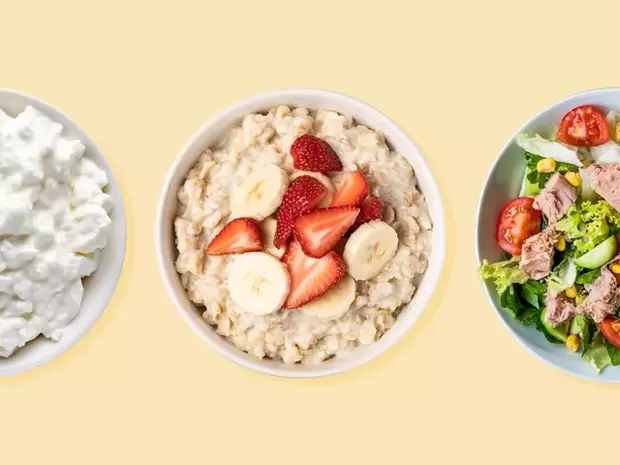
Why you shouldn't give up protein
- You can't build muscle without protein. When athletes gain muscle mass, they need to consume large amounts of protein. If you're not an athlete and just want to lose fat, don't eliminate protein from your diet: without protein, your muscles won't recover properly after training.
- Hair, teeth, nails, and bones can deteriorate and weaken due to a lack of protein in the diet.
- Protein is made up of amino acids - the body requires 22 amino acids for normal function, of which 9 are not produced by the body and are obtained from food. When you eliminate protein from your menu, you're not getting something your body can't function with normally.
- Without proteins, there would be no metabolic processes as they serve as transporters of oxygen molecules to the cells of the body.
- Trying to limit yourself to plant-based proteins (for vegetarians) has consequences: not all essential amino acids are found in grains, nuts, and soy. Vegetarians need special vitamins and dietary supplements.
Protein Diet for Weight Loss: How It Works
- Protein, especially from meat, activates the production of the satiety hormone (leptin) and inhibits the production of the hunger hormone (ghrelin): this is why foods that satisfy "cruel hunger" are often understood as meat;
- Protein speeds up your metabolism and helps you burn calories quickly. Dukan, Atkins, Malysheva, Kremlin and many other weight loss diets are based on this. Ketosis has the same properties: when a person consumes large amounts of protein and fat, but very few carbohydrates, the body enters a state of ketosis, effectively shedding excess fat;
- In case of intensive weight loss through physical activity, the protein menu is very important to combat sagging skin (which may occur with sudden weight loss) and to strengthen bones, teeth and hair.
Protein Diet Rules
- Protein should make up 50% (ideally 60%) of your daily menu.
- Fats and carbohydrates should be reduced, ideally to no more than 15% of the daily diet.
- Vegetables and herbs complement the protein menu with fiber and vitamins.
- Sugary fruits should be limited to 2 servings per day.
- You need to drink plenty of water and of course avoid sweetened sodas.
- There are no preservatives, sauces and mayonnaise on the menu.
- The focus is on foods that are not fried, boiled or steamed.
- Meals should be divided into portions, 5-6 times a day, no more than 200 grams each time.
- Physical activity is important for speeding up your metabolism and therefore for losing weight faster.
- anemia;
- Pregnancy and breastfeeding;
- kidney disease;
- pancreatic disease;
- heart and blood vessel problems;
- diabetes;
- Individual protein intolerance conditions.
- Increase the content of protein products in the diet: introduce meat, fish, eggs, green vegetables, dairy products and fermented dairy products;
- Monitor your total daily caloric intake;
- Eat small, frequent meals and drink enough fluids;
- Minimize frying when cooking, eliminate mayonnaise from your diet, and reduce salt and coffee consumption;
- To speed up weight loss, you need feasible physical activity.
How to make a menu correctly
Now about planning your weight loss protein menu. Many people feel uncomfortable when a ready-made menu is offered during the week. We'll show you the broad options you can focus on. Or put together your own menu for the week from them.breakfast
important Despite its benefits, grains contain a lot of carbohydrates that can wreak havoc on your diet. Therefore, we recommend not to regularly include porridge, muesli and granola in the menu.
dinner
important If your goal is to lose weight, pay attention to your caloric intake. Our lunch options should be thought of as alternative dishes: combining a first course with a salad or a main course with a salad, but not exceeding the daily calorie level.
dinner
suggestion Fish dishes are often high in protein and nutrients, but often lower in calories; try to include them in your diet at least 3 times a week.















































































